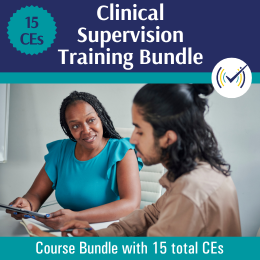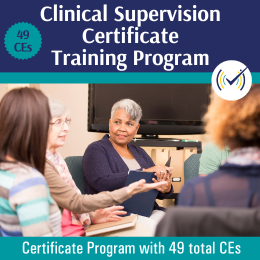If your aim is to earn and be awarded the title of Clinical Supervisor by your licensing board, you may need to fulfill specific continuing education (CE) hour requirements to qualify for that distinction.
Our specially designed CE course bundles will help you meet those requirements and ensure you are well-prepared for effective and ethical supervision. Whether you need 10, 15, 20, 30, or 49 CE hours, our bundles cover essential and advanced topics, providing the knowledge and skills you need to excel in supervisory roles.
Start Your Journey Today!
Invest in your professional development and meet your state’s CE requirements
with our Clinical Supervision Training Bundles.
Enhance your skills, expand your knowledge, and become a more effective clinical supervisor.
Enrollment in each bundle offers:
- Access to individual courses that each offer CEs
- Instruction provided by seasoned Clinical Supervisors on a variety of topics
- A discount of 25% to 60% off individual course registration fees
10 CE Clinical Supervision Bundle
Enhance your clinical supervision skills with our 10 CE Clinical Supervision Training Bundle. This bundle is ideal for counselors who need to meet specific continuing education (CE) requirements to qualify as clinical supervisors. Covering fundamental aspects of supervision, this bundle provides the essential training needed to excel in supervisory roles. Enrollment in the 10 CE Clinical Supervision Training Bundle includes:
- Four individual courses that offer a total of 10 CEs
- Instruction provided by seasoned Clinical Supervisors on a variety of topics
- Instruction material that addresses clinical supervision topics
Upon registration, the following courses will be added to your account:
Foundations of Supervision: Preparing for Effective Supervision
- Description: Gain a solid foundation in supervision principles. Learn to establish effective supervisory relationships, understand the roles and responsibilities of supervisors, and develop strategies for successful supervision. Learn More.
Navigating Licensure Supervision Within an Organization
- Description: Learn how to navigate the complexities of licensure supervision within an organizational context. This course provides practical insights and strategies for effective organizational supervision. Learn More.
Race, Power, and Privilege: Addressing Cross Cultural Dynamics in Supervision
- Description: Address and manage cross-cultural dynamics within the supervisory relationship. This course covers topics of race, power, and privilege, enhancing cultural competency in supervision. Learn More.
Models of Clinical Supervision
- Description: Explore different models of clinical supervision, understanding their theoretical foundations and practical applications. This course helps supervisors select and implement appropriate supervision models. Learn More.
Once each course has been completed, individual Certificates of Completion indicating CEs will be issued.
Courses included in this bundle were recorded between 2/12/21 and 11/17/23
Upon completion of "Foundations of Supervision: Preparing for Effective Supervision", participants will be able to:
- List three possible benefits and drawbacks of telemental health.
- Explain how licensure law in the United States impacts telemental health services.
- List three ethical standards that are specifically related to telemental health.
- Describe the process of conducting video and phone therapy sessions from start to finish.
Upon completion of "Navigating Licensure Supervision Within an Organization", participants will be able to:
- Describe the difference between administrative versus clinical supervision.
- Conduct effective supervision via teleservices.
- Document processes for supervision.
Upon completion of "Race, Power, and Privilege: Addressing Cross Cultural Dynamics in Supervision”, participants will be able to:
- Examine power dynamics in the supervisory relationship.
- Identify errors in cross-cultural supervision.
- Describe strategies to address culture in supervision.
Upon Completion of “Models of Clinical Supervision", participants will be able to:
- Describe the four major categories of clinical supervision models and specific models from each category.
- Identify the strengths and limitations of supervision models as described in the research literature.
- Analyze the various supervision models and explain how context, format, and culture are important considerations when applying a supervision model in practice.
Credit Hours: This bundle consists of a total of 10 continuing education hours of credit (1.5 of which are ethics). Each course offers an individual certificate of completion indicating CEs earned for that course.
Counselors: Telehealth Certification Institute, LLC has been approved by NBCC as an Approved Continuing Education Provider, ACEP No, 6693. Programs that do not qualify for NBCC credit are clearly identified. Telehealth Certification Institute, LLC is solely responsible for all aspects of the programs.
Telehealth Certification Institute, LLC is recognized by the New York State Education Department's State Board for Mental Health Practitioners as an approved provider of continuing education for Licensed Mental Health Counselors. #MHC-0048.
Marriage and Family Therapists: Many MFT licensing boards accept our courses or one of the approvals which we have from professional associations. You can check with your board to determine if your licensing board would accept this course.
Social Workers: Telehealth Certification Institute LLC, #1609, is approved as an ACE provider to offer social work continuing education by the Association of Social Work Boards (ASWB) Approved Continuing Education (ACE) program. Regulatory boards are the final authority on courses accepted for continuing education credit. ACE provider approval period: 05/02/2024 – 05/02/2027. Social workers completing these courses receive 10 total credits, including 8.5 clinical and 1.5 ethics continuing education credits.
Telehealth Certification Institute, LLC is recognized by the New York State Education Department's State Board for Social Work as an approved provider of continuing education for Licensed Social Workers #SW-0435.
Addiction Professionals: This course has been approved by Telehealth Certification Institute LLC, as a NAADAC Approved Education Provider, for educational credits. NAADAC Provider #193104, Telehealth Certification Institute LLC is responsible for all aspects of the programming.
Psychologists: Telehealth Certification Institute LLC is approved by the American Psychological Association to sponsor continuing education for psychologists. Telehealth Certification Institute LLC maintains responsibility for this program and its content.
Telehealth Certification Institute, LLC is recognized by the New York State Education Department’s State Board for Psychology as an approved provider of continuing education for Licensed Psychologists #PSY-0128.
Art Therapists: Telehealth Certification Institute, LLC is recognized by the New York State Education Department's State Board for Mental Health Practitioners as an approved provider of continuing education for Licensed Creative Arts Therapists #CAT-0093.
Other Professionals: This course qualifies for 600 minutes of instructional content as required by many national, state and local licensing boards and professional organizations. Retain your certificate of completion and contact your board or organization for specific filing requirements.
These are non-interactive, self-study courses.
Online self-study courses are non-interactive and include recorded instruction, a post-test and evaluation. Participants have 6 months from registration to complete coursework and claim the certificate of completion.
#1 = Roles and functions of clinical supervisors
#2 = Theoretical frameworks and models of clinical supervision
#3 = Supervisory relationship issues.
#8 = Administrative procedures and responsibilities related to clinical supervision
#10 = Culturally responsive clinical supervision
15 CE Clinical Supervision Bundle
Elevate your clinical supervision expertise with our 15 CE Clinical Supervision Training Bundle. This bundle is designed for counselors who need to fulfill continuing education (CE) requirements to qualify as clinical supervisors. It covers essential supervision topics, ensuring you are equipped with the necessary skills and knowledge for effective and ethical supervision. Enrollment in the 15 CE Clinical Supervision Training Bundle includes:
Four individual courses that offer a total of 15 CEs
Instruction provided by seasoned Clinical Supervisors on a variety of topics
Instruction material that addresses clinical supervision topics
Upon registration, the following courses will be added to your account:
Methods of Supervision (5.5 CEs)
Description: Discover various methods and techniques used in clinical supervision. This course covers different supervision models, practical applications, and strategies for effective supervision. Learn more
TeleSupervision and TeleConsultation (3 CEs)
Description: Adapt your supervision skills to the digital age with this course on telesupervision and teleconsultation. Learn the best practices, ethical considerations, and technical aspects of remote supervision. Learn more
Navigating Licensure Supervision Within an Organization (1 CE)
Description: Learn to navigate the complexities of licensure supervision within an organizational context. This course provides practical insights and strategies to manage licensure supervision effectively. Learn more
Ethics for Supervisors (5.5 Ethics CEs)
Description: Delve into the ethical challenges and responsibilities of clinical supervision. Learn to navigate ethical dilemmas, uphold professional standards, and maintain ethical practices in supervision. Learn more
Once each course has been completed, individual Certificates of Completion indicating CEs will be issued.
Courses included in this bundle were recorded between 5/18/20 and 5/19/23
Upon completion of "Methods of Supervision", participants will be able to:
- Explain the importance of having a model of supervision.
- List several methods of supervision.
- List two ways for building supervisee cultural competence.
- Illustrate methods of monitoring, providing feedback, and evaluations.
- Discuss suggestions for managing supervisee concerns, deficiencies and anxiety.
Upon completion of "TeleSupervision and TeleConsultation", participants will be able to:
- Address, enhance, and identify beginning supervisors and advanced supervisors concerns about telesupervision.
- Address special considerations for the individual needs of supervisees in group supervision, assess how group telesupervision can accelerate supervisees’ learning and ways to decrease barriers to telesupervision.
- Explore the developmental needs of supervisees and increase the supervisee’s commitment to the working alliance within the structured environment needed in telesupervision.
Upon completion of "Navigating Licensure Supervision Within an Organization", participants will be able to:
- Describe the difference between administrative versus clinical supervision.
- Conduct effective supervision via teleservices.
- Document processes for supervision.
Upon completion of "Ethics for Supervisors", participants will be able to:
- Name ethical areas of supervisor competence, knowledge, and practice
- Identify key ethics of the supervisory relationship
- Discuss the ethical aspects of gatekeeping and monitoring supervisee development and competence
- Describe common examples of liability concerns and a suggestion for managing
Credit Hours: This bundle consists of a total of 15 continuing education hours of credit (5.5 of which are ethics). Each course offers an individual certificate of completion indicating CEs earned for that course.
Counselors: Telehealth Certification Institute, LLC has been approved by NBCC as an Approved Continuing Education Provider, ACEP No, 6693. Programs that do not qualify for NBCC credit are clearly identified. Telehealth Certification Institute, LLC is solely responsible for all aspects of the programs.
Telehealth Certification Institute, LLC is recognized by the New York State Education Department's State Board for Mental Health Practitioners as an approved provider of continuing education for Licensed Mental Health Counselors. #MHC-0048.
Marriage and Family Therapists: Many MFT licensing boards accept our courses or one of the approvals which we have from professional associations. You can check with your board to determine if your licensing board would accept this course.
Social Workers: Telehealth Certification Institute LLC, #1609, is approved as an ACE provider to offer social work continuing education by the Association of Social Work Boards (ASWB) Approved Continuing Education (ACE) program. Regulatory boards are the final authority on courses accepted for continuing education credit. ACE provider approval period: 05/02/2024 – 05/02/2027. Social workers completing these courses receive 15 total credits, including 9.5 clinical and 5.5 ethics continuing education credits.
Telehealth Certification Institute, LLC is recognized by the New York State Education Department's State Board for Social Work as an approved provider of continuing education for Licensed Social Workers #SW-0435.
Addiction Professionals: This course has been approved by Telehealth Certification Institute LLC, as a NAADAC Approved Education Provider, for educational credits. NAADAC Provider #193104, Telehealth Certification Institute LLC is responsible for all aspects of the programming.
Psychologists: Telehealth Certification Institute LLC is approved by the American Psychological Association to sponsor continuing education for psychologists. Telehealth Certification Institute LLC maintains responsibility for this program and its content.
Telehealth Certification Institute, LLC is recognized by the New York State Education Department’s State Board for Psychology as an approved provider of continuing education for Licensed Psychologists #PSY-0128.
Art Therapists: Telehealth Certification Institute, LLC is recognized by the New York State Education Department's State Board for Mental Health Practitioners as an approved provider of continuing education for Licensed Creative Arts Therapists #CAT-0093.
Other Professionals: This course qualifies for 900 minutes of instructional content as required by many national, state and local licensing boards and professional organizations. Retain your certificate of completion and contact your board or organization for specific filing requirements.
These are non-interactive, self-study courses.
Online self-study courses are non-interactive and include recorded instruction, a post-test and evaluation. Participants have 6 months from registration to complete coursework and claim the certificate of completion.
#4 = Methods and techniques for clinical supervision
#7 = Utilization of technology in clinical supervision
#8 = Administrative procedures and responsibilities related to clinical supervision
#9 = Legal and ethical issues and responsibilities in clinical supervision
20 CE Clinical Supervision Bundle
Enhance your clinical supervision skills with our 20 CE Clinical Supervision Training Bundle. This bundle is ideal for counselors who need to meet continuing education (CE) requirements to qualify as clinical supervisors. It covers essential topics and advanced techniques, ensuring you are well-prepared for effective and ethical supervision. Enrollment in the 20 CE Clinical Supervision Training Bundle includes:
- Seven individual courses that offer a total of 20 CEs
- Instruction provided by seasoned Clinical Supervisors on a variety of topics
- Instruction material that addresses clinical supervision topics
Upon registration, the following courses will be added to your account:
Foundations of Supervision: Preparing for Effective Supervision (6 CEs)
- Description: Gain a solid foundation in supervision principles. Learn to establish effective supervisory relationships, understand the roles and responsibilities of supervisors, and develop strategies for successful supervision. Learn more
TeleSupervision and TeleConsultation (3 CEs)
- Description: Adapt your supervision skills to the digital age with this course on telesupervision and teleconsultation. Learn the best practices, ethical considerations, and technical aspects of remote supervision. Learn more
Documentation for Supervisors (1.5 CEs)
- Description: Ensure your documentation practices meet legal and ethical standards. This course covers the essentials of proper documentation for supervisors, including record-keeping and confidentiality. Learn more
Ethics for Supervisors (5.5 Ethics CEs)
- Description: Delve into the ethical challenges and responsibilities of clinical supervision. Learn to navigate ethical dilemmas, uphold professional standards, and maintain ethical practices in supervision. Learn more
Race, Power, and Privilege: Addressing Cross Cultural Dynamics in Supervision (1.5 Ethics CEs)
- Description: Address and manage cross-cultural dynamics within the supervisory relationship. This course covers topics of race, power, and privilege, enhancing cultural competency in supervision. Learn more
Models of Clinical Supervision (1.5 CEs)
- Description: Explore different models of clinical supervision, understanding their theoretical foundations and practical applications. This course helps supervisors select and implement appropriate supervision models. Learn more
Navigating Licensure Supervision Within an Organization (1 CE)
- Description: Learn how to navigate the complexities of licensure supervision within an organizational context. This course provides practical insights and strategies for effective organizational supervision. Learn more
Once each course has been completed, individual Certificates of Completion indicating CEs will be issued.
Courses included in this bundle were recorded between 5/18/20 and 11/17/23
Upon completion of "Foundations of Supervision: Preparing for Effective Supervision", participants will be able to:
- List three possible benefits and drawbacks of telemental health.
- Explain how licensure law in the United States impacts telemental health services.
- List three ethical standards that are specifically related to telemental health.
- Describe the process of conducting video and phone therapy sessions from start to finish.
Upon completion of "TeleSupervision and TeleConsultation", participants will be able to:
- Address, enhance, and identify beginning supervisors and advanced supervisors concerns about telesupervision.
- Address special considerations for the individual needs of supervisees in group supervision, assess how group telesupervision can accelerate supervisees’ learning and ways to decrease barriers to telesupervision.
- Explore the developmental needs of supervisees and increase the supervisee’s commitment to the working alliance within the structured environment needed in telesupervision.
Upon completion of "Documentation for Supervisors", participants will be able to:
- Describe the value of documentation in supporting our professional work.
- Participants will define key components of supervision documentation including maintaining a supervisee file.
- Participants will identify several tips for enhanced, best practice note content.
Upon completion of "Navigating Licensure Supervision Within an Organization", participants will be able to:
- Describe the difference between administrative versus clinical supervision.
- Conduct effective supervision via teleservices.
- Document processes for supervision.
Upon completion of "Ethics for Supervisors", participants will be able to:
- Name ethical areas of supervisor competence, knowledge, and practice
- Identify key ethics of the supervisory relationship
- Discuss the ethical aspects of gatekeeping and monitoring supervisee development and competence
- Describe common examples of liability concerns and a suggestion for managing
Upon completion of "Race, Power, and Privilege: Addressing Cross Cultural Dynamics in Supervision”, participants will be able to:
- Examine power dynamics in the supervisory relationship.
- Identify errors in cross-cultural supervision.
- Describe strategies to address culture in supervision.
Upon Completion of “Models of Clinical Supervision", participants will be able to:
- Describe the four major categories of clinical supervision models and specific models from each category.
- Identify the strengths and limitations of supervision models as described in the research literature.
- Analyze the various supervision models and explain how context, format, and culture are important considerations when applying a supervision model in practice.
Credit Hours: This bundle consists of a total of 20 continuing education hours of credit (7 of which are ethics). Each course offers an individual certificate of completion indicating CEs earned for that course.
Counselors: Telehealth Certification Institute, LLC has been approved by NBCC as an Approved Continuing Education Provider, ACEP No, 6693. Programs that do not qualify for NBCC credit are clearly identified. Telehealth Certification Institute, LLC is solely responsible for all aspects of the programs.
Telehealth Certification Institute, LLC is recognized by the New York State Education Department's State Board for Mental Health Practitioners as an approved provider of continuing education for Licensed Mental Health Counselors. #MHC-0048.
Marriage and Family Therapists: Many MFT licensing boards accept our courses or one of the approvals which we have from professional associations. You can check with your board to determine if your licensing board would accept this course.
Social Workers: Telehealth Certification Institute LLC, #1609, is approved as an ACE provider to offer social work continuing education by the Association of Social Work Boards (ASWB) Approved Continuing Education (ACE) program. Regulatory boards are the final authority on courses accepted for continuing education credit. ACE provider approval period: 05/02/2024 – 05/02/2027. Social workers completing these courses receive 20 total credits, including 13 clinical and 7 ethics continuing education credits.
Telehealth Certification Institute, LLC is recognized by the New York State Education Department's State Board for Social Work as an approved provider of continuing education for Licensed Social Workers #SW-0435.
Addiction Professionals: This course has been approved by Telehealth Certification Institute LLC, as a NAADAC Approved Education Provider, for educational credits. NAADAC Provider #193104, Telehealth Certification Institute LLC is responsible for all aspects of the programming.
Psychologists: Telehealth Certification Institute LLC is approved by the American Psychological Association to sponsor continuing education for psychologists. Telehealth Certification Institute LLC maintains responsibility for this program and its content.
Telehealth Certification Institute, LLC is recognized by the New York State Education Department’s State Board for Psychology as an approved provider of continuing education for Licensed Psychologists #PSY-0128.
Art Therapists: Telehealth Certification Institute, LLC is recognized by the New York State Education Department's State Board for Mental Health Practitioners as an approved provider of continuing education for Licensed Creative Arts Therapists #CAT-0093.
Other Professionals: This course qualifies for 1200 minutes of instructional content as required by many national, state and local licensing boards and professional organizations. Retain your certificate of completion and contact your board or organization for specific filing requirements.
These are non-interactive, self-study courses.
Online self-study courses are non-interactive and include recorded instruction, a post-test and evaluation. Participants have 6 months from registration to complete coursework and claim the certificate of completion.
#1 = Roles and functions of clinical supervisors
#2 = Theoretical frameworks and models of clinical supervision
#3 = Supervisory relationship issues.
#7 = Utilization of technology in clinical supervision
#8 = Administrative procedures and responsibilities related to clinical supervision
#9 = Legal and ethical issues and responsibilities in clinical supervision
#10 = Culturally responsive clinical supervision
30 CE Clinical Supervision Bundle
Elevate your clinical supervision skills with our comprehensive 30 CE Clinical Supervision Training Bundle. This bundle is designed for counselors who need to meet continuing education (CE) requirements to qualify as clinical supervisors. It covers essential topics and advanced techniques, ensuring you are well-prepared for effective and ethical supervision. Enrollment in the 30 CE Clinical Supervision Training Bundle includes:
- Eight individual courses that offer a total of 30 CEs
- Instruction provided by seasoned Clinical Supervisors on a variety of topics
- Instruction material that addresses clinical supervision topics
Upon registration, the following courses will be added to your account:
Foundations of Supervision: Preparing for Effective Supervision (6 CEs)
- Description: Gain a solid foundation in supervision principles. Learn to establish effective supervisory relationships, understand the roles and responsibilities of supervisors, and develop strategies for successful supervision. Learn more
Understanding and Developing an Effective Clinical Supervision Relationship (5.5 CEs)
- Description: Explore the dynamics of the supervisory relationship. Understand how to foster a supportive and productive environment, manage power dynamics, and enhance communication. Learn more
Methods of Supervision (5.5 CEs)
Description: Discover various methods and techniques used in clinical supervision. This course covers different supervision models, practical applications, and strategies for effective supervision. Learn more
TeleSupervision and TeleConsultation (3 CEs)
- Description: Adapt your supervision skills to the digital age with this course on telesupervision and teleconsultation. Learn the best practices, ethical considerations, and technical aspects of remote supervision. Learn more
Documentation for Supervisors (1.5 CEs)
- Description: Ensure your documentation practices meet legal and ethical standards. This course covers the essentials of proper documentation for supervisors, including record-keeping and confidentiality. Learn more
Ethics for Supervisors (5.5 Ethics CEs)
- Description: Delve into the ethical challenges and responsibilities of clinical supervision. Learn to navigate ethical dilemmas, uphold professional standards, and maintain ethical practices in supervision. Learn more
Race, Power, and Privilege: Addressing Cross Cultural Dynamics in Supervision (1.5 Ethics CEs)
- Description: Address and manage cross-cultural dynamics within the supervisory relationship. This course covers topics of race, power, and privilege, enhancing cultural competency in supervision. Learn more
Models of Clinical Supervision (1.5 CEs)
- Description: Explore different models of clinical supervision, understanding their theoretical foundations and practical applications. This course helps supervisors select and implement appropriate supervision models. Learn more
Once each course has been completed, individual Certificates of Completion indicating CEs will be issued.
Courses included in this bundle were recorded between 5/18/20 and 11/17/23
Upon completion of "Foundations of Supervision: Preparing for Effective Supervision", participants will be able to:
- List three possible benefits and drawbacks of telemental health.
- Explain how licensure law in the United States impacts telemental health services.
- List three ethical standards that are specifically related to telemental health.
- Describe the process of conducting video and phone therapy sessions from start to finish.
Upon completion of "Understanding and Developing an Effective Clinical Supervision Relationship", participants will be able to:
- Discuss the importance of a supervisory relationship and measuring its effectiveness.
- Share key aspects/traits for building a collaborative relationship.
- Explain the importance of power in the relationship and how to use it appropriately and effectively.
- Describe ways to prevent or resolve conflict and resistance.
Upon completion of "Methods of Supervision", participants will be able to:
- Explain the importance of having a model of supervision.
- List several methods of supervision.
- List two ways for building supervisee cultural competence.
- Illustrate methods of monitoring, providing feedback, and evaluations.
- Discuss suggestions for managing supervisee concerns, deficiencies and anxiety.
Upon completion of "TeleSupervision and TeleConsultation", participants will be able to:
- Address, enhance, and identify beginning supervisors and advanced supervisors concerns about telesupervision.
- Address special considerations for the individual needs of supervisees in group supervision, assess how group telesupervision can accelerate supervisees’ learning and ways to decrease barriers to telesupervision.
- Explore the developmental needs of supervisees and increase the supervisee’s commitment to the working alliance within the structured environment needed in telesupervision.
Upon completion of "Documentation for Supervisors", participants will be able to:
- Describe the value of documentation in supporting our professional work.
- Participants will define key components of supervision documentation including maintaining a supervisee file.
- Participants will identify several tips for enhanced, best practice note content.
Upon completion of "Ethics for Supervisors", participants will be able to:
- Name ethical areas of supervisor competence, knowledge, and practice
- Identify key ethics of the supervisory relationship
- Discuss the ethical aspects of gatekeeping and monitoring supervisee development and competence
- Describe common examples of liability concerns and a suggestion for managing
Upon completion of "Race, Power, and Privilege: Addressing Cross Cultural Dynamics in Supervision”, participants will be able to:
- Examine power dynamics in the supervisory relationship.
- Identify errors in cross-cultural supervision.
- Describe strategies to address culture in supervision.
Upon Completion of “Models of Clinical Supervision", participants will be able to:
- Describe the four major categories of clinical supervision models and specific models from each category.
- Identify the strengths and limitations of supervision models as described in the research literature.
- Analyze the various supervision models and explain how context, format, and culture are important considerations when applying a supervision model in practice.
Credit Hours: This bundle consists of a total of 30 continuing education hours of credit (7 of which are ethics). Each course offers an individual certificate of completion indicating CEs earned for that course.
Counselors: Telehealth Certification Institute, LLC has been approved by NBCC as an Approved Continuing Education Provider, ACEP No, 6693. Programs that do not qualify for NBCC credit are clearly identified. Telehealth Certification Institute, LLC is solely responsible for all aspects of the programs.
Telehealth Certification Institute, LLC is recognized by the New York State Education Department's State Board for Mental Health Practitioners as an approved provider of continuing education for Licensed Mental Health Counselors. #MHC-0048.
Marriage and Family Therapists: Many MFT licensing boards accept our courses or one of the approvals which we have from professional associations. You can check with your board to determine if your licensing board would accept this course.
Social Workers: Telehealth Certification Institute LLC, #1609, is approved as an ACE provider to offer social work continuing education by the Association of Social Work Boards (ASWB) Approved Continuing Education (ACE) program. Regulatory boards are the final authority on courses accepted for continuing education credit. ACE provider approval period: 05/02/2024 – 05/02/2027. Social workers completing these courses receive 20 total credits, including 23 clinical and 7 ethics continuing education credits.
Telehealth Certification Institute, LLC is recognized by the New York State Education Department's State Board for Social Work as an approved provider of continuing education for Licensed Social Workers #SW-0435.
Addiction Professionals: This course has been approved by Telehealth Certification Institute LLC, as a NAADAC Approved Education Provider, for educational credits. NAADAC Provider #193104, Telehealth Certification Institute LLC is responsible for all aspects of the programming.
Psychologists: Telehealth Certification Institute LLC is approved by the American Psychological Association to sponsor continuing education for psychologists. Telehealth Certification Institute LLC maintains responsibility for this program and its content.
Telehealth Certification Institute, LLC is recognized by the New York State Education Department’s State Board for Psychology as an approved provider of continuing education for Licensed Psychologists #PSY-0128.
Art Therapists: Telehealth Certification Institute, LLC is recognized by the New York State Education Department's State Board for Mental Health Practitioners as an approved provider of continuing education for Licensed Creative Arts Therapists #CAT-0093.
Other Professionals: This course qualifies for 1800 minutes of instructional content as required by many national, state and local licensing boards and professional organizations. Retain your certificate of completion and contact your board or organization for specific filing requirements.
These are non-interactive, self-study courses.
Online self-study courses are non-interactive and include recorded instruction, a post-test and evaluation. Participants have 6 months from registration to complete coursework and claim the certificate of completion.
#1 = Roles and functions of clinical supervisors
#2 = Theoretical frameworks and models of clinical supervision
#3 = Supervisory relationship issues.
#4 = Methods and techniques for clinical supervision
#7 = Utilization of technology in clinical supervision
#8 = Administrative procedures and responsibilities related to clinical supervision
#9 = Legal and ethical issues and responsibilities in clinical supervision
#10 = Culturally responsive clinical supervision
49 CE Certificate Program
The Clinical Supervision Certificate Program is a comprehensive training program for active clinical supervisors or for those just beginning their supervision practice. This customized selection of expert-led courses offers up to 49 CEs (10.5 of which are Ethics). Enrollment in the Clinical Supervision Certificate Training Program includes:
- Fifteen individual courses that offer a total of 49 CEs
- Instruction provided by seasoned Clinical Supervisors on a variety of topics
- The Clinical Supervision Certificate (CSC)
For more details on the Clinical Supervision Certificate Program, please visit this page.
Upon registration, the following 15 courses will be added to your account, along with access to the Clinical Supervision Certificate:
- Foundations of Supervision: Preparing for Effective Supervision, Online Self-Study
- Theoretical Frameworks and Models of Clinical Supervision, Online Self-Study
- Understanding and Developing an Effective Clinical Supervision Relationship, Online Self-Study
- Methods of Supervision, Online Self-Study
- The Nuts and Bolts of Clinical Supervision in Groups, Online Self-Study
- How Clinical Supervisors Can Adjust Their Evaluative Lens by Understanding the “Zone of Proximal Development”, Online Self-Study
- The Ethical Dance with Gatekeeping: The Common Complaints Against Therapists That Supervisors Need to Know, Online Self-Study
- Preparing Supervisees for TeleMental Health, Online Self-Study
- TeleSupervision and TeleConsultation, Online Self-Study
- Documentation for Supervisors, Online Self-Study
- Navigating Licensure Supervision Within an Organization, Online Self-Study
- It’s Not Just Your Name on the Line: How Your Contract Supports Compliance and Standards in Clinical Supervision, Online Self-Study
- Ethics for Supervisors, Online Self-Study
- Fostering Counselor Development Utilizing a Social Justice Lens in Supervision, Online Self-Study
- Race, Power, and Privilege: Addressing Cross Cultural Dynamics in Supervision, Online Self-Study
Once each course has been completed and the Certificate of Completion indicating CEs has been issued, participants can then claim the Clinical Supervision Certificate (CSC)
Credit Hours: This bundle consists of a total of 49 continuing education hours of credit (10.5 of which are ethics). Each course offers an individual certificate of completion indicating CEs earned for that course.
Counselors: Telehealth Certification Institute, LLC has been approved by NBCC as an Approved Continuing Education Provider, ACEP No, 6693. Programs that do not qualify for NBCC credit are clearly identified. Telehealth Certification Institute, LLC is solely responsible for all aspects of the programs.
Telehealth Certification Institute, LLC is recognized by the New York State Education Department's State Board for Mental Health Practitioners as an approved provider of continuing education for Licensed Mental Health Counselors. #MHC-0048.
Marriage and Family Therapists: Many MFT licensing boards accept our courses or one of the approvals which we have from professional associations. You can check with your board to determine if your licensing board would accept this course.
Social Workers: Telehealth Certification Institute LLC, #1609, is approved as an ACE provider to offer social work continuing education by the Association of Social Work Boards (ASWB) Approved Continuing Education (ACE) program. Regulatory boards are the final authority on courses accepted for continuing education credit. ACE provider approval period: 05/02/2024 – 05/02/2027. Social workers completing these courses receive 49 total credits, including 38.5 clinical and 10.5 ethics continuing education credits.
Telehealth Certification Institute, LLC is recognized by the New York State Education Department's State Board for Social Work as an approved provider of continuing education for Licensed Social Workers #SW-0435.
Addiction Professionals: This course has been approved by Telehealth Certification Institute LLC, as a NAADAC Approved Education Provider, for educational credits. NAADAC Provider #193104, Telehealth Certification Institute LLC is responsible for all aspects of the programming.
Psychologists: Telehealth Certification Institute LLC is approved by the American Psychological Association to sponsor continuing education for psychologists. Telehealth Certification Institute LLC maintains responsibility for this program and its content.
Telehealth Certification Institute, LLC is recognized by the New York State Education Department’s State Board for Psychology as an approved provider of continuing education for Licensed Psychologists #PSY-0128.
Art Therapists: Telehealth Certification Institute, LLC is recognized by the New York State Education Department's State Board for Mental Health Practitioners as an approved provider of continuing education for Licensed Creative Arts Therapists #CAT-0093.
Other Professionals: This course qualifies for 2940 minutes of instructional content as required by many national, state and local licensing boards and professional organizations. Retain your certificate of completion and contact your board or organization for specific filing requirements.
These are non-interactive, self-study courses.
Online self-study courses are non-interactive and include recorded instruction, a post-test and evaluation. Participants have 6 months from registration to complete coursework and claim the certificate of completion.
#1 = Roles and functions of clinical supervisors
#2 = Theoretical frameworks and models of clinical supervision
#3 = Supervisory relationship issues.
#4 = Methods and techniques for clinical supervision
#5 = Group supervision
#6 = Evaluation, remediation, and gatekeeping in supervision.
#7 = Utilization of technology in clinical supervision
#8 = Administrative procedures and responsibilities related to clinical supervision
#9 = Legal and ethical issues and responsibilities in clinical supervision
#10 = Culturally responsive clinical supervision
Important Disclaimer: Please review the specific requirements of your licensing board to ensure these courses meet all the criteria for earning the title of Clinical Supervisor. Completing one of these programs does not guarantee that you will meet all of your licensing board's requirements.
Instructors for Clinical Supervision courses include:
Ruby Blow is a licensed professional counselor in the state of Georgia. Her current practice focus is professional development and she provides tele-supervision and tele-consultation. Her services include both group and individual modalities. Ruby is a leader in the field of clinical supervision practice and has been in practice for 22 years. In 2012, Ruby won the Counselor Educator of the Year Award in the state of Georgia from the Professional Counselors Association. She has worked with mental health professionals in the area of clinical development from the beginning of her career. She taught for 10 years as an adjunct faculty member at Argosy University Atlanta. During her time as a clinical instructor, she led students in their practicum internships as their instructor of record. She gained experience in distance supervision leading all online sections of practicum/internship seminar. Ruby is an approved clinical supervisor and a board certified telemental health provider.
 Ruby L. Blow, MA, LPC, NCC, BCC, CPCS, ACS, DCC, BC-TMH
Ruby L. Blow, MA, LPC, NCC, BCC, CPCS, ACS, DCC, BC-TMHKristin Ryan Easley, M.S., L.P.C., NCC, owner of Grow Deep Counseling, LLC, is a passionate, skilled licensed counselor, counselor educator, clinical supervisor, speaker/trainer, and consultant with over 25 years of experience. Kristin draws from her extensive counseling experience and expertise to deliver engaging workshops to a variety of audiences from small groups to large public and private institutions, churches, agencies, and practices both in person and online. With a gift for growing and mentoring people, Kristin delivers practical workshops and trainings in an engaging style where audiences learn applicable tools and concepts for enhanced personal knowledge and professional practice.
You can read more about Kristin Ryan Easley by clicking here.
 Kristin Ryan Easley, M.S., L.P.C., NCC
Kristin Ryan Easley, M.S., L.P.C., NCCMalcolm Horn-Charnesky started her career working with the elderly and adults with disabilities. She has over 10 years of progressive clinical experience working with the complex diagnoses that often accompany addictions and co-occurring disorders. Malcolm started working specifically with addictions in 2006 when she moved to Billings and started working at Rimrock. She coordinates the continuing education for licensed staff, ensuring they have opportunities to appropriate continuing education units to improve their skills and ability to meet the needs of clients. Malcolm also supervises and coordinates the internship program and ensures all learning objectives are met. She provides educational lectures and workshops to patients and community members and also conducts adjunctive group, family, and individual therapy.
Malcolm received her Master’s in Social Work from Walla Walla College, is a Licensed Clinical Social Worker and is licensed by the state of Montana as an Addiction Counselor. She also has accreditation from the NAADAC (National Association of Alcohol and Drug Addiction Counselors) as a Masters level Addiction Counselor. She is a SAP (Substance Abuse Professional) certified by the DOT through NAADAC as well as the only nationally certified intervention professional (NCIP) in Montana. Malcolm was the President of the Montana Association of Drug and Alcohol Counselors from 2015-2017 and is the current regional vice president for the national association. She is the president-elect of NAADAC and teaches two courses at Montana-State University-Billings. Malcom completed her Ph.D. in psychology in April of 2019.
 Dr. Malcolm Horn, PhD, LCSW, LAC, SAP, MAC
Dr. Malcolm Horn, PhD, LCSW, LAC, SAP, MACMary Kate Reese, PhD, LPC, CPCS, is a skilled counselor, clinical supervisor, counselor educator, and consultant with over 30 years of experience. Mary Kate is currently a core faculty member at Walden University, where she is the course manager for the Supervision course in the doctoral program, which she also teaches regularly. In addition, Mary Kate periodically provides workshops on supervision and ethics for mental health professionals who are obtaining continuing education credit. Mary Kate uses an engaging style in her teaching, and does not simply lecture to a passive audience! Her students leave with knowledge and skills that can easily be applied to their professional work.
 Mary Kate Reese, PhD, LPC, CPCS
Mary Kate Reese, PhD, LPC, CPCSDr. Ebony White is a Licensed Professional Counselor, a National Certified Counselor, and an Approved Clinical Supervisor. She is an Assistant Clinical Professor in the Department of Counseling and Family Therapy and the Program Director of the Master in Addiction’s Counseling program at Drexel University.
As the Executive Director of the Center for Mastering and Refining Children’s Unique Skills (MARCUS), a non-profit organization, she focuses on expanding developmental pathways for at-promise adolescents in Trenton, NJ through counseling, mentoring, and tutoring. Clinically she focuses primarily on issues that impact the relationships and functioning of African Americans, primarily women and teens. She also provides multicultural and mental health training for law enforcement, religious leaders, educators, and community members.
Dr. Ebony is a master TeamStepps trainer, a curriculum designed to improve the functioning of teams in healthcare settings. Although she primarily provides training for the College of Nursing and Health Professions at Drexel University, she recently trained healthcare professionals internationally in Gombe State, Nigeria using these techniques. She appeared on TVC News Nigeria for her presentation on using effective communication strategies in healthcare settings to prevent fatalities as provided at the Nigeria Health Leadership Conference in April 2019.
Dr. Ebony’s research interests broadly focus on advocacy and social justice within the African American community. Specifically, she is interested in the impact of individual and systemic trauma on the development and functioning of individuals and families within the African diaspora nationally and globally. She has done trauma focused mental health work in Croix des Bouquets, Haiti and in her hometown of Trenton, NJ. She has appeared on CBS to discuss the impact of mass shootings on mental health as well as the everyday violence that plague under-resourced communities in urban settings and the subsequent trauma response that may occur. Her opinion is often sought out around topics of mental health, trauma, and racism and has been featured in numerous outlets including Newsweek, Medium, the Philadelphia Inquirer, PopSugar, and the New York Times, to name a few. She has also done extensive research on issues in adoption, particularly transracial adoption, including examining adoptees’ experiences with microaggressions and their perception of counselors’ competence with adoption-related issues.
Dr. Ebony understands the importance of mentorship. Aside from everyday mentoring in which she engages, she is proud to be a MACY mentor, a Liberty Scholar’s Mentor, and a peer collaborator for the Mandela Fellowship program. She is also the faculty advisor for NAMI Drexel, a student organization that focuses on reducing mental health stigma on campus and CATs of Color. In 2019, she was nominated by her peers for the Locke-Paisley Outstanding Mentor Award given by the Association for Counselor Education and Supervision.
In 2007, Dr. Ebony received the Woman of the Year award from the Mercer County Commission on women. She also received the Community Service Award from the NJ State Federation of Colored Women’s Clubs and the Carver Youth and Family Center in 2018. In 2021 she was awarded the Dr. Judy Lewis Counselor for Social Justice award from the American Counseling Association. She has presented her research at various conferences nationally and internationally, including the Congressional Black Caucus in Washington, D.C. Dr. White has been published in peer-reviewed articles and appears in the newly released video from Alexander Street Press titled, Helping Counselors and Psychologists as Advocates and Activists: Strength, Solidarity, Strategy and Sustainability. She has appeared on several radio shows and television programs discussing mental health and the African American community in an effort to reduce stigma and strengthen communities.
Dr. Ebony strongly believes that you must be at the table to determine the menu and thus holds service positions in several counseling organizations. She is the President Elect of Counselors for Social Justice and the Immediate Past Chair for the North Atlantic Region of the American Counseling Association. Additionally, she is the host of the EbtheCeleb podcast.
Dr. Ebony is community focused and strongly identifies as an advocate, counselor, and educator. She recognizes the village that raised her and lives by Ubuntu, “I am because we are, and because we are, I am.” She is excited to continue the work.
Read more about Dr. Ebony here and about the Center for MARCUS here.
 Ebony White, PhD, LPC, NCC, ACS
Ebony White, PhD, LPC, NCC, ACS








The course was so informative and I was glued to my screen for the entire duration. I received so much knowledge concerning ethics in telehealth and I am greatly encouraged to read about all the standards and policies that pertain to my practice. Thank you!.